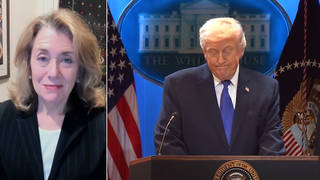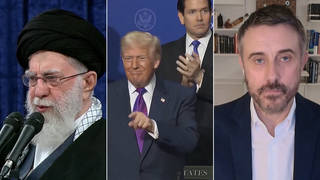
The Department of Defense has introduced a new press policy requiring the Pentagon to authorize any reporting on itself. Top TV news outlets have rejected the pledge; only the far-right outlet One America News has agreed to sign on. Dozens of reporters with the Pentagon Press Association turned in their government-issued press badges and left the building Wednesday rather than agree to the rules. “The Trump administration has made the suppression of speech that it doesn’t like a governing principle since it took office,” says David Schulz, who advised the Pentagon Press Association on their response. He warns the “desire of the Pentagon officials to control what is said about them” is “alarming” and signals a major rupture in U.S. press freedoms.
Transcript
AMY GOODMAN: This is Democracy Now!, democracynow.org. I’m Amy Goodman, with Nermeen Shaikh.
NERMEEN SHAIKH: Dozens of reporters handed in their access badges and walked out of the Pentagon Wednesday instead of agreeing to the Defense Department’s new press policy. The policy states that media outlets and reporters cannot obtain any information that the Pentagon does not explicitly authorize. About 40 to 50 journalists from major news outlets left together before the 4 p.m. deadline.
In a joint statement, NBC News, ABC News, CBS News, CNN and Fox News all said, quote, “We join virtually every other news organization in declining to agree to the Pentagon’s new requirements, which would restrict journalists’ ability to keep the nation and the world informed of important national security issues.”
The only news outlet to agree to the new Pentagon rules is the far-right One America News Network.
AMY GOODMAN: For more, we go to David Schulz, director of the Media Freedom and Information Access Clinic at Yale University. He advised the Pentagon Press Association on how to handle the Pentagon’s new rules and has worked on several precedent-setting cases on the public’s right of access to government documents.
Professor, welcome to Democracy Now! David Schulz, welcome. So, at 4:00 yesterday, you have all these journalists turning in their badges and taking out their equipment from their offices and walking outside. Explain exactly what Hegseth, who most recently worked for Fox News, now the defense secretary — what he has demanded.
DAVID SCHULZ: Yes. So, thanks. Good morning.
This is really a watershed moment, because what the Pentagon is doing is imposing a set of policies that, essentially, would regulate how the press can do its business. There’s two, at least two, really important things that they’re trying to do, the Pentagon is trying to do. One is, it has specifically said that it’s impermissible to solicit information from people who work at the Pentagon. The policy originally said something like that the unauthorized acquisition of information is grounds to lose your press pass. Well, you know, what they call solicitation, we call news gathering. That’s something that’s protected by the Constitution, and reporters have to be able to gather information, ask questions, seek out the news, if we’re to have a free press, which is exactly what the First Amendment guarantees to us. That was one.
The other is that he’s asked them to sign a document expressing under — in writing, their understanding of a statement that’s asserted that the unauthorized disclosure of classified and unclassified information from the Pentagon can cause harm to national security. Well, that is a statement that is just untrue. We know that there’s a lot of classified information that can be disclosed. It might be embarrassing, but it’s not harming the national security. And to require reporters to sign that is essentially to say to them that if you — excuse me — if you disclose something without authorization, you’re subject to prosecution under the Espionage Act, which makes it a crime to disclose information that can cause harm to the United States. So, it’s outrageous in several respects.
And I would just like to underscore how extreme this is, the watershed moment that we’re at. You know, the Trump administration has made the suppression of speech that it doesn’t like a governing principle since it took office. It’s done a number of things: baseless lawsuits against the media, the targeting of regulatory sanctions against speech that the president doesn’t like, access restrictions to the White House and others. But this goes a step further. It’s not just a restriction on access. It’s saying, if you want access, you have to gather the news the way we think it should be gathered. And the American media, to their credit, has said, “That’s not how things work here. We have a free press. And if you are going to kick us out of the building, we’ll do it from outside the building.”
NERMEEN SHAIKH: And, David, if you could talk about the other steps that the Pentagon has taken to limit media access? I mean, the Defense Secretary Pete Hegseth has held only two formal press briefings since he assumed office, and the Pentagon had previously placed restrictions on where reporters could go. And Hegseth has also initiated investigations into leaks to the media. So, if you could elaborate: All of this together, what does this mean about reporting on what the Defense Department is doing?
DAVID SCHULZ: Yeah, well, you’re quite right. This is kind of the culmination of a whole series of steps that kind of display the desire of the Pentagon officials to control what is said about them — few press conferences, using polygraphs against people inside the Pentagon to find out where leaks are, and even these new regulations, the new policy that they have imposed. They tried to justify it by saying it’s, you know, common sense, we have to protect national security.
But we should be clear there is no need for this, that the access rules that govern the Pentagon have been in place since the building was built during World War II. Through administrations of both political parties over decades, this system has worked, and there has been no risk to the national security.
One of the things that the Secretary Hegseth did back in the spring is he was surprised that a reporter was in the hallway outside his office. They were allowed to use the hallways to get around. They couldn’t get into classified areas, but they could walk around. So, the first thing he did was limit access, so that three-quarters of the building is now off grounds for physical access, which means that the baristas who push coffee carts around and delivery people and a number of other people who have no security clearance can continue to roam the halls, but reporters couldn’t. And that was the beginning of this whole process that has led us to where we are today. It’s just — it’s unnecessary, it’s alarming, and it shouldn’t be happening.
AMY GOODMAN: David, you advise the Pentagon Press Association. Why did they turn in their badges? Why didn’t they simply say, “No, we’re going to remain Pentagon reporters, and we’re not going to agree on these limitations”? And finally, if you can talk about some of the great reporting in the past — Sy Hersh on My Lai, “Collateral Murder,” the showing of the Iraqi prisoners in Baghdad with the U.S. soldiers, being tortured? Certainly none of these got prior approval from the Pentagon.
DAVID SCHULZ: Yeah, no, you’re exactly right. And that’s why the press, en masse, in unison — almost — you know, there was one organization that essentially is a propaganda outlet for the administration, but everybody else said, “No, we are a free press. We’re not going to go along with this.”
You say, “Why didn’t they just stay there?” Well, they’re not going to, you know, physically stay in a place where they’re told that they can’t stay. I think there are legal remedies to be pursued, and I suspect that there will be more developments on this in the near future. The courts are still open to hold officials to account when they exceed their constitutional authority. And I think that’s what’s going on here, and I suspect that we haven’t seen the end of this.
AMY GOODMAN: Well, David Schulz, we thank you for being with us, director of the Media Freedom and Information Access Clinic at Yale University.
A happy belated birthday to Juan González! Juan is in Delaware today, has been there for two days giving speeches. You can check our website at democracynow.org. I’ll be in Santa Fe, New Mexico, tomorrow, on October 17th, at the Lensic Theater, where the film Steal This Story, Please! will be premiering in New Mexico, be there at 6:00 and being involved with the Q&A after with the Oscar-nominated director Tia Lessin. On Saturday, I’ll be at the Woodstock Film Festival in Woodstock, New York, at the Woodstock Playhouse at 3:00. I’m Amy Goodman, with Nermeen Shaikh, for another edition of Democracy Now!, democracynow.org.












Media Options